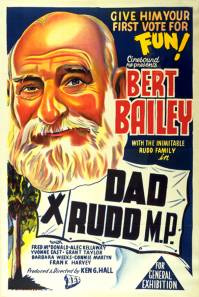Script
The last six films made by Cinesound Productions were all comedies as producer Ken G. Hall sought to ensure guaranteed box office successes. He elected to make another Dad and Dave film instead of two other long-planned projects, an adaptation of Robbery Under Arms [6] and a story about the Overland Telegraph. [7] Hall said in 1939 that:
Though we were entertaining the idea of other types of stories, the amazing enthusiasm for Dad and Dave Come to Town makes another Bailey picture the wisest commercial choice. We feel that, by placing 'Dad' in politics, we will inject any amount of comedy material which is typical of Bailey at his best. [8]
William Freshman was originally reported as having worked on the script [9] and is credited along with Frank Harvey on the script submitted for copyright registration with the National Archives of Australia. However he does not have screen credit. Filmink argued "it feels as though Bailey would have had a pass at the script, and the structure and romantic scenes... feel very “Frank Harvey like” – it’s a stronger screenplay than Freshman’s Come Up Smiling. Comic sequences were most likely composed by Cinesound’s uncredited gag team." [5]
The movie was more serious than others in the series, being basically a drama with comic interludes. Bert Bailey commented during filming that:
In one of the old 'Selection' books, Dad did stand for Parliament. But that was for comedy purposes. In Dad Rudd, M.P., when Dad does come down and speak in Parliament, there is not one tinge of comedy. He is an earnest old chap, speaking in a plain, ordinary, common-sense way on water conservation. He is saying what he believes is the right thing to be done for the farmer, and for the country. For water is a national asset. In this scene, Dad does allude to the war. He says that the spirit which animated the pioneers who crossed the plains and fought the land is the same spirit behind the adventurous boys who go abroad to fight for Australia." [10]
Filmink argued "The movie is quite cynical on the Australian political scene." [5]
Ken Hall himself edited out this speech when the film screened on ABC TV in 1970. "In the light of the world as we know it in the seventies, it all sounded so follow, so phony, so naive", he wrote. But the speech remains in most copies of the film available today. [11]
Casting
The romantic leads were played by Yvonne East and Grant Taylor, both graduates of the Cinesound Talent School making their first film. [12] Chips Rafferty makes an early screen appearance as a fireman in the Keystone Cops-style opening sequence. Hall says he was looking for someone tall and thin to contrast with the other firemen and Ron Whelan introduced him to Rafferty. Hall later put Rafferty in some reshoots he did for Come Up Smiling, making this Rafferty's first performance. [13]
The cast had more continuity than usual for a Cinesound Rudd film, with Alec Kellaway, Connie Martyn, Ossie Wenban, Valerie Scanlan and Marshall Crosby all reprising their roles from Dad and Dave Come to Town (1938). [14]
American actor Barbara Weeks, who was visiting Australia at the time of shooting with her husband, played a small role at the behest of Ken G. Hall. [15]
Shooting
During pre production, Cinesound was visited by Adolph Zukor, founder of Paramount Pictures, then touring Australia. He had seen Dad and Dave Come to Town on the boat trip from the US, and been so impressed with the film's quality he wanted to visit the studio. [16]
Shooting took place in February and March 1940, in the Cinesound Studio and on location at Woronora Dam and Camden. [17] Cinesound hired space on the lot of the closed-down Pagewood studios for building a scale reproduction of the dam for the climax. These were supervised by J Alan Kenyon, who did the special effects for most of Cinesound's movies. The fake dam was 125 feet long and held 12,000 gallons of water. [18]
According to Hall:
It was the smoothest, best-made of the Bert Bailey films. In the process of the gradual evolution of the people and the storylines we had set down for these productions, the rawness had gone off the characters. There was much less burlesque of the types. The story was more modern and believable. [19]
The movie was partly financed with a guaranteed overdraft of £15,000 from the New South Wales government. [20]
